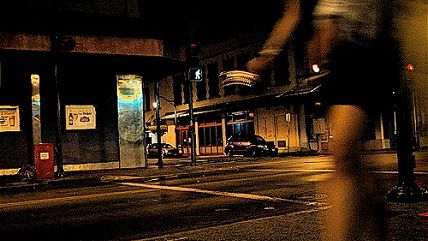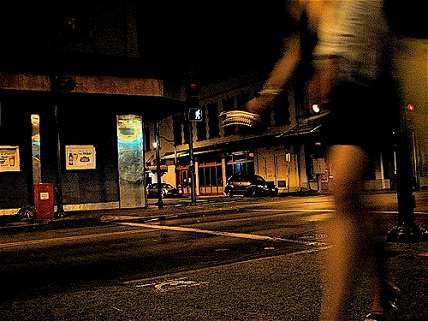The Mythical Invasion of the Super Bowl Hookers
There's no reality behind the idea that some Lost Tribe of Gypsy Harlots wanders about the world from mega-event to mega-event, unimpeded by the usual logistics of transport and lodging.


Major events such as World's Fairs and the Olympics always provide an excuse for governments to "clean things up" in the host cities before the guests arrive. Police sweep people the leaders consider undesirable, embarrassing or just plain unsightly out of public view (and into jails or exile for the duration). The victims vary with the time and place: the poor, the homeless, unpopular minority groups, drug addicts and gay people have all been among them. The list always includes sex workers; even in countries where prostitution is legal (such as Greece or Brazil) the moralists feel compelled to purge the most visible manifestations of the sex trade from areas where visitors might encounter them. Xenophobia is also heightened by such events, as those so predisposed fear the prospect of strangers coming to town, bringing with them outlandish and alien forms of sin and crime. Together, these two factors may be the origin of one of the stranger (yet more persistent) myths of our time: the idea that some Lost Tribe of Gypsy Harlots, tens of thousands strong, wanders about the world from mega-event to mega-event, unimpeded by the usual logistics of transport and lodging which should make the migration of such a large group a daunting task indeed.
The legend seems to have first appeared in conjunction with the 2004 Olympics in Athens. That's telling because, though the rebranding of sex work as "sex trafficking" was already underway in prohibitionist circles in the late 1990s, the moral panic seems to have begun in earnest in January of 2004. In the months before the Olympics Athenian officials went through the usual cleansing procedure, raiding brothels for largely bogus violations of zoning restrictions. A Greek sex workers' union complained that by making it difficult to work in legal brothels the city would increase illegal prostitution, and this was twisted by European prohibitionists into "Athens is encouraging sex tourism."
By the end of the year, the growing "anti-trafficking" movement was using bad stats to claim that "sex trafficking increased by 95 percent during the Olympics." Within a few months, anti-sex worker groups made the bizarre prediction that approximately 40,000 women would be "trafficked" into Germany for the 2006 FIFA World Cup. Of course, nothing of the kind happened. Despite increased police actions (including raids on 71 brothels), the German authorities only came up with five cases of exploitation they believed to be linked to the event. The Global Alliance Against Traffic in Women, which closely investigated the myth in its 2011 report "What's the Cost of a Rumour?", was unable to find a credible source for the "40,000" figure; it seems to have simply been made up. But it has doggedly persisted since then, accompanying virtually every major sporting event including the 2010 World Cup in South Africa, the 2010 Olympics in Vancouver, and the 2012 Olympics in London. Despite massive police crackdowns (costing about £500,000 in London), no significant increase in prostitution (coerced or otherwise) has ever been found during these large events.
By 2008, the myth reached the United States, where it became attached to the Super Bowl (taking the place, perhaps, of the fading but equally spurious claim that domestic violence skyrockets on the day of the game). The story in Phoenix that year largely took the form of police statements that they had "received…warnings about an increase in prostitution and [were] prepared for it," but by the following year police and other officials in Tampa had turned the rumor into a campaign…which bagged exactly one quarry, a 14-year-old pimped by two rather clueless individuals on Craigslist under the heading "Super Bowl Special" (a detail regularly repeated as part of the prohibitionist catechism since then).
The Florida Department of Children and Families supposedly "rescued" 24 other people (though this is unsubstantiated). But that number pales beside the grandiosity of the claims that "'tens of thousands of people'—most of them young girls—[were] sold into the sex trade during Miami's Super Bowl in 2010." Miami was the first instance of the full-blown circus-like hype which has characterized the buildup to the game in subsequent years, where members of "anti-trafficking" groups descend in droves upon the host city to "raise awareness" and "rescue victims".
Not to be outdone, Texas Attorney General Greg Abbott declared the Super Bowl "one of the largest human trafficking events in the United States"; in preparation for the Dallas game (2011) he organized a huge "task force" involving a dozen different federal, state and local agencies, and missed no opportunity to pontificate about "pimps" and Backpage.com. The total haul from all this effort? One would-be pimp who got the idea from hearing the myth on television.
But legends like this take on a life of their own, which cannot be ended by mere facts. By July, Indiana's attorney general, Greg Zoeller, got the Indianapolis Super Bowl bandwagon rolling with the claim that the Texans had actually made "133 separate human trafficking related arrests," a number obtained by dishonestly representing every vice arrest made in the Dallas-Fort Worth Metroplex during the two and a half week period around the game as a "trafficking" case (the number has since become part of the narrative).
And while the hype around the New Orleans game last year was actually somewhat muted, Cindy McCain, apparently unwilling to wait her turn, is already beating the drum over "human trafficking" for the 2015 Super Bowl in Phoenix. Nor is the myth limited to the Super Bowl any more; in the past two years similar claims have been made about other large football games and sporting events ranging from the Kentucky Derby to the Sturgis Motorcycle Rally to hunting season in rural Minnesota.
The media has been largely complicit in spreading this lurid fantasy, but there have been a few dissenting voices. One is Pete Kotz of Village Voice Media, who interviewed me for "The Super Bowl Prostitute Myth" three years ago, and expanded upon that article for "The Super Bowl Prostitution Hoax" the following year. The latter piece has been quoted in several others since then, such as this year's "The Super Bowl Sex-Trafficking Story That Just Won't Die" (which also references the GAATW report cited above).
Even if such articles weren't easily located with a quick search, all a reporter with a particle of skepticism would need to do is go to Snopes.com, which has listed the story as false since February 2012. But because sex sells and what anthropologist and commercial sex researcher Dr. Laura Agustín calls the "rescue industry" brings in (at a minimum) tens of millions of dollars per year, there are quite a few people in and out of government with a vested interest in keeping the myth going no matter how destructive, absurd, and demonstrably false it happens to be.
There is, however, a glimmer of hope: an article in Canada's National Post reports that some within the "anti-trafficking" movement itself have become disillusioned with the legend:
"There are no statistics whatsoever that show an increase in people being trafficked during these events," said Laura Murphy, head of the New Orleans Human Trafficking Working Group, host city of Super Bowl 2013…
"A lot of these numbers that have been popping up for the Super Bowl, we just really don't agree with and we don't know where they came from," said Giselle Rodriguez, outreach coordinator at the Florida Coalition Against Human Trafficking.
While the True Believers can be counted on to ignore anything skeptics or sex worker rights advocates have to say about the issue, they may listen to those they consider fellow travelers. With any luck the Super Bowl Prostitute Invasion story may finally be on the way out, and we can only hope that the "sex trafficking" hysteria of which it is a part will follow closely behind.


Show Comments (56)